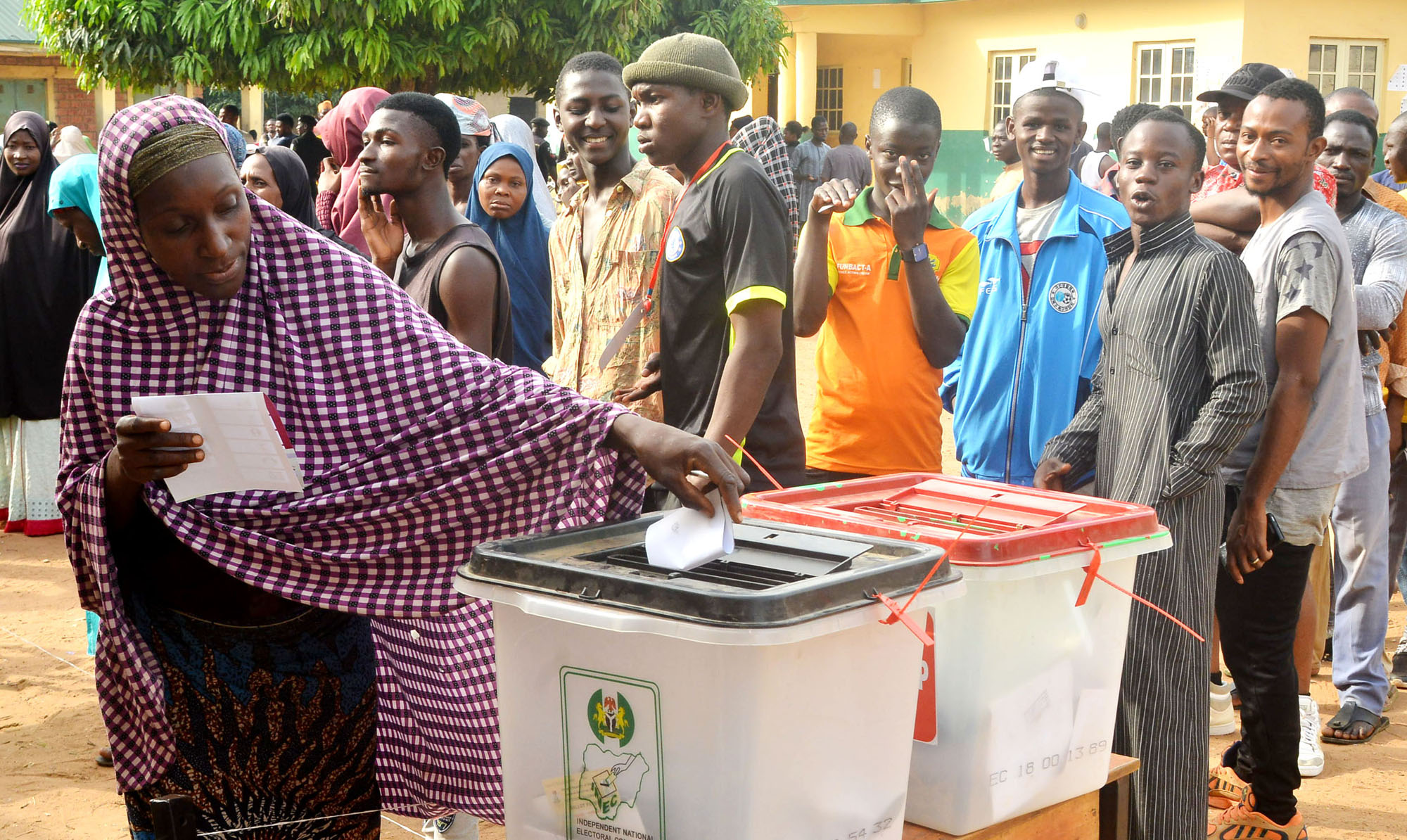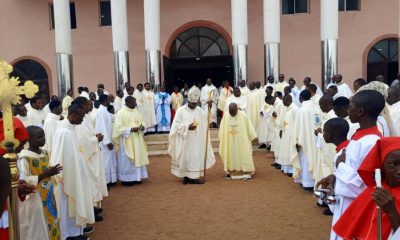NEWS
Association Commends Kaduna over e-voting LG Polls

From Haruna Aliyu Usman, Birnin Kebbi
Seadogs Pyrates Confroternity (our votes count initiative), has commended the Kaduna State government for the use of e-voting during the recently concluded local governments elections in the state.
In a press statement made available to newsmen at the weekend, the association commended the use of e-machine by the Kaduna State Independent Electoral Commission in the just concluded local government elections in Kaduna.
According to the Capoon of the association who is also the regional leader of the association northwest Henry Nduka Onyia Kaduna chapter said though the conduct of the elections not hundred percent ok but indicated that there is hope for democracy and the teaming youth in the country.
The statement added that, local government elections conducted by state electoral bodies in the country offer little for an enduring democracy hence the reason for increased voter awareness by the association which aim at enlightening electorates to hold their leaders accountable.
Onyia explained that despite voter apathy that greeted the just concluded local government polls in Kaduna there was little reports of manipulation from ward level to local government.
The association noted that, the electronic voting machines deployed and used in Kaduna during local councils polls was a victory for democracy reference to June the 12 elections in 1993 so it’s expected other states in the country will take cue and learn from it the statement added.
Henry who commended the state governor Nasir el-Rufai for the successful conduct of 2021 local councils elections, the associate also extends congratulatory message to the Dr Sarah Binta Audu who chaired the entire polls and 9m Kaduna residents who showed 200m Nigerians that free, fair and credible election is possible especially with a strong political will the statement added.
On voter apathy that characterised the just concluded Kaduna local governments elections,the association advocated the use of none governmental organization like the apex Arewa women association “Matan Arewa Market Association, community youth leaders and some socail media influencers like Ja’afar, Jafa’afar and others like him can be used to create awareness on the need for people to know their right to ensure their votes counts in future elections and to fight impunity as the it is the core mandate of seadogs pirates confraternity.
Mr Henry added that, the significant gains made by Kaduna independent electoral commission is a clarion call to the 35 states independent electoral bodies when they decide to conduct local councils polls as Kaduna has now become the pace setter, which many others will copy “seadogs confraternity will in addition include old students association in our resolve under the aegis of our votes count initiative to propagate voter awareness as tool to be used in future elections”.
Seadogs confraternity as an association will continue to positively impact people in tandem with their mandate.
NEWS
FG Imposes 7-year Ban on New Federal Tertiary Institutions

The Federal Executive Council (FEC) has approved a seven-year moratorium on the establishment of new federal tertiary institutions.
Dr Tunji Alausa, Minister of Education announced the approval, after Wednesday’s FEC meeting, presided over by President Bola Tinubu at the Presidential Villa, Abuja.
He explained the ban applies to all federal universities, polytechnics, and colleges of education.
According to Alausa, the decision aims to address systemic decay caused by unregulated expansion.
”What we are witnessing today is duplication of new federal tertiary institutions, a significant reduction in the current capacity of each institution, and degradation of both physical infrastructure and manpower.
”“If we do not act decisively, it will lead to marked declines in educational quality and undermine the international respect that Nigerian graduates command.”
“We are doing this to further halt decays in tertiary institutions which may in future affect the quality of education and consequently cause unemployment of graduates from some of these institutions.”
Alausa noted Nigeria currently has 72 federal universities, 108 state universities, and 159 private universities with similar trends in polytechnics and colleges of education.
He pointed to a growing mismatch between the number of institutions and available student enrollment.
He cited a northern university with fewer than 800 students but over 1,200 staff, calling it unsustainable.
The minister described the moratorium as a bold corrective measure by the Tinubu administration.
He said the government would now focus on upgrading existing institutions, improving infrastructure, boosting manpower, and increasing capacity.
“We need to improve the quality of our education system and increase the carrying capacity of our current institutions so that Nigerian graduates can maintain and enhance the respect they enjoy globally.”
The minister however announced that the Council approved 9 new private universities out of the 79 active requests pending applications.
”Several of these applications have been in the pipeline for over six years, with investors having already built campuses and invested billions of Naira,” he explained.
“Due to inefficiencies within the NUC, approvals were delayed. We have since introduced reforms to streamline these processes, and today’s approvals are a result of clearing this backlog.”
(NAN)
Foreign News
CAF Sanctions Kenya Again over Crowd Trouble

The Confederation of African Football (CAF) has sanctioned African Nations Championship (CHAN) co-host, Kenya, for the second time in as many weeks over security breaches.
In a statement made available on Monday evening, the continental governing body said that it has limited entry to the 48,000-seat Moi International Sports Centre.
It also said that, known as Kasarani Stadium, can accommodate 27,000 fans for Sunday’s Group A match between Kenya and Zambia.
CAF said only electronic ticket holders would be allowed into the stadium, with thermal tickets prohibited.
The governing body warned that Kenya’s matches could be relocated from Kasarani Stadium if organisers fail to prevent further breaches.
“We trust these measures will be applied swiftly to protect competition’s integrity, ensure fan safety, and uphold confidence in Kenya’s commitment to the tournament,” CAF said.
The sanctions follow incidents on Aug. 10 when Kenya defeated two-time winner Morocco 1-0 in spite of playing the entire second half with 10 men.
The win put Kenya top of Group A with seven points.
The debutants would reach the quarterfinals with at least a draw against winless Zambia.
Last week, Kenya’s football federation was fined nearly 20,000 U.S. dollars for security lapses during the team’s 1-0 win over DR Congo in the tournament opener on Aug. 3.
In the latest case, CAF cited major lapses, including stadium gates and restricted service areas being overrun by ticketless spectators and holders of government-distributed physical tickets.
It also accused security personnel of losing control at exit points and allowing breaches of the perimeter fence that enabled thousands of ticketless fans to enter.
CAF had expressed alarm over the use of tear gas and flash grenades, reports of live ammunition fired near spectators and staff, and violent incidents such as stone-throwing at security personnel.
It also cited unsafe vehicle movement in spectator areas, inadequate police response, and the lack of medical incident reports in spite of injuries being reported.
Organisers were further criticised for insufficient communication tools and the absence of CCTV coverage at critical entry points.
Education
Varsity Don Advocates Establishment of National Bureau for Ethnic Relations, Inter-Group Unity

By David Torough, Abuja
A university scholar, Prof. Uji Wilfred of the Department of History and International Studies, Federal University of Lafia, has called on the Federal Government to establish a National Bureau for Ethnic Relations to strengthen inter-group unity and address the deep-seated ethnic tensions in Nigeria, particularly in the North Central region.
Prof.
Wilfred, in a paper drawing from years of research, argued that the six states of the North Central—Kwara, Niger, Kogi, Benue, Plateau, and Nasarawa share long-standing historical, cultural, and economic ties that have been eroded by arbitrary state boundaries and ethnic politics.According to him, pre-colonial North Central Nigeria was home to a rich mix of ethnic groups—including Nupe, Gwari, Gbagi, Eggon, Igala, Idoma, Jukun, Alago, Tiv, Birom, Tarok, Angas, among others, who coexisted through indigenous peace mechanisms.
These communities, he noted, were amalgamated by British colonial authorities under the Northern Region, first headquartered in Lokoja before being moved to Kaduna.
He stressed that state creation, which was intended to promote minority inclusion, has in some cases fueled exclusionary politics and ethnic tensions. “It is historically misleading,” Wilfred stated, “to regard certain ethnic nationalities as mere tenant settlers in states where they have deep indigenous roots.”
The don warned that such narratives have been exploited by political elites for land grabbing, ethnic cleansing, and violent conflicts, undermining security in the sub-region.
He likened Nigeria’s ethnic question to America’s historic “race question” and urged the adoption of structures similar to the Freedmen’s Bureau, which addressed racial inequality in post-emancipation America through affirmative action and equitable representation.
Wilfred acknowledged the recent creation of the North Central Development Commission by President Bola Tinubu as a step in the right direction, but said its mandate may not be sufficient to address ethnic relations.
He urged the federal government to either expand the commission’s role or create a dedicated Bureau for Ethnic Relations in all six geo-political zones to foster reconciliation, equality, and sustainable development.
Quoting African-American scholar W.E.B. Du Bois, Prof. Wilfred concluded that the challenge of Nigeria in the 21st century is fundamentally one of ethnic relations, which must be addressed with deliberate policies for unity and integration.





























